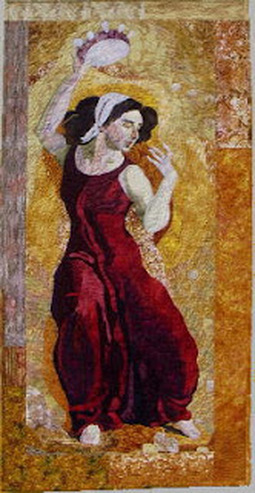It reminds me of another Biblical paradox – the burning bush. A symbol of the undoing of the natural order, where fire does not bring destruction...on the contrary, it brings revelation. The voice of God calls out from the impossible endurance of a shrub amidst flames. That which should logically be destroyed, endures. And not just endures, but initiates and ushers in what is to become history's greatest symbol of liberation, the Exodus from Egypt. The fiery shrub is the holy ground from which God speaks.
This paradox of endurance amidst destruction is quite possibly one of the defining characteristics of the Jewish people. The State of Israel has been described as a phoenix, risen from the flames of the Holocaust. But not only is it a country that has risen from the flames, it is a country that thrives amidst the flames of continuing fires of attack from her neighbors. It is a country ensconced in conflict, yet somehow, at its best and highest, remains untouched.
And so too with Jerusalem. Never before has a metropolis weathered such unending quarrels. And yet, amidst the conflagration, she endures as a city of peace, issuing a message of godliness and the promise of salvation.
It is said that the burning bush was nothing extraordinary to most who looked upon it. A dozen others walked right past it. What proved Moses’ greatness is that he saw the miracle within it. He turned aside and wondered at it. He heard God’s voice in it. He removed his shoes.
Sometimes that is how I experience Jerusalem. Usually it is just the mundane domain where I shop and shlep my bags and pay my bills. But sometimes, at the best of times, I turn aside from the mundane drone of my day and see the astounding miracle that is being worked beneath my very feet.
This Yom Yerushalayim is an invitation to stop and acknowledge the utter miracle of this city. An invitation to hear the voice of God issuing from each alley, each corner store, each traffic jam. This Yom Yerushalayim, may we, and the whole world, see Yerushalayim as a city which sits serene and enduring, offering peace, even amidst the flames.
The Burning Bush
Jerusalem, my burning bush
A city so inflamed,
and yet, endurance is your name.
Here roam my heart & mind
Where, walk me soft,
and put my shoes aside
and let me admire more
this site
which burns
with no less bark
and no less branch
Eternal spark
within its stance
And blaze
My days with hers
And let no less than all of her endure
And may she brighter burn
that I may longer gaze and learn –
this mystery of Yours.

 RSS Feed
RSS Feed
